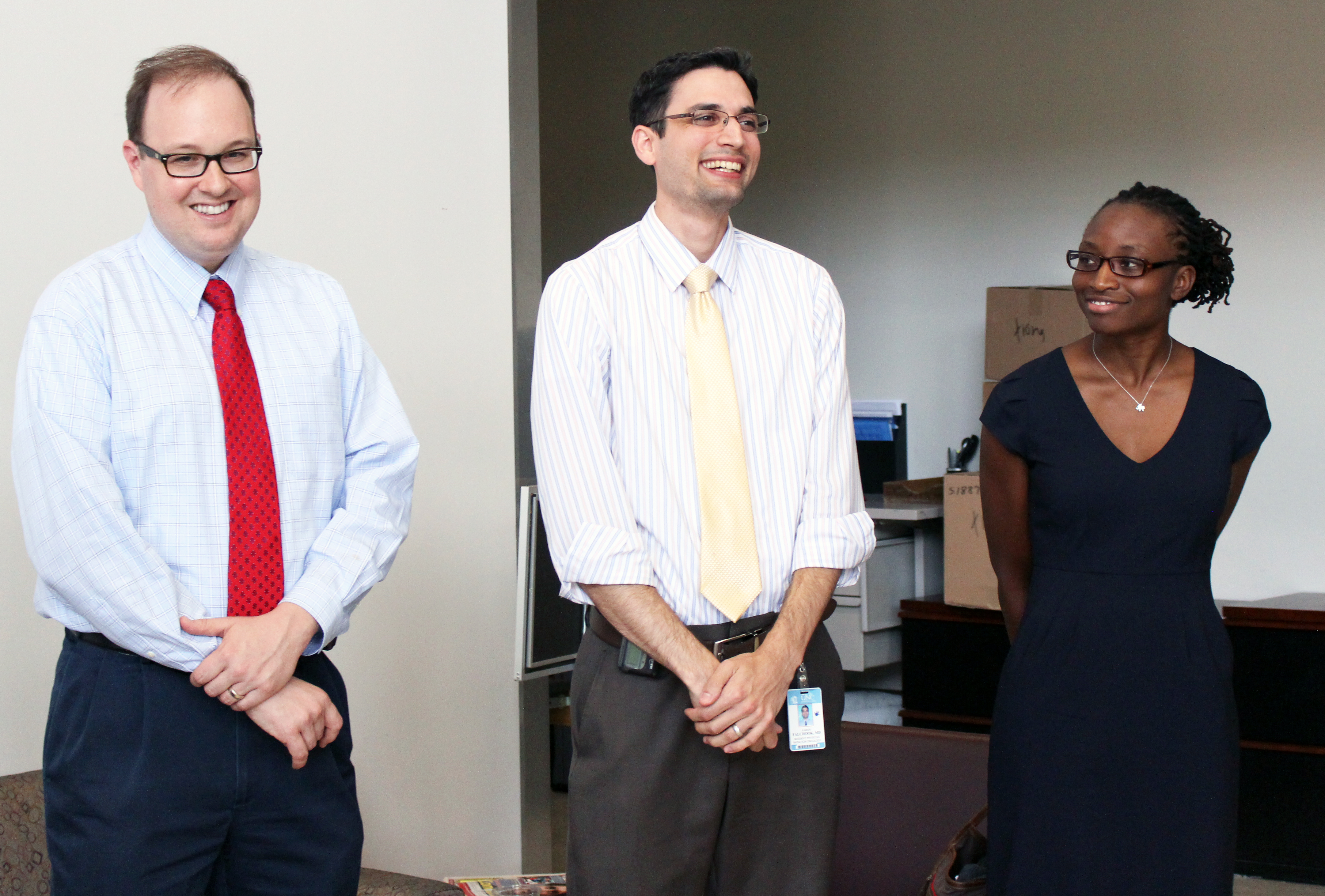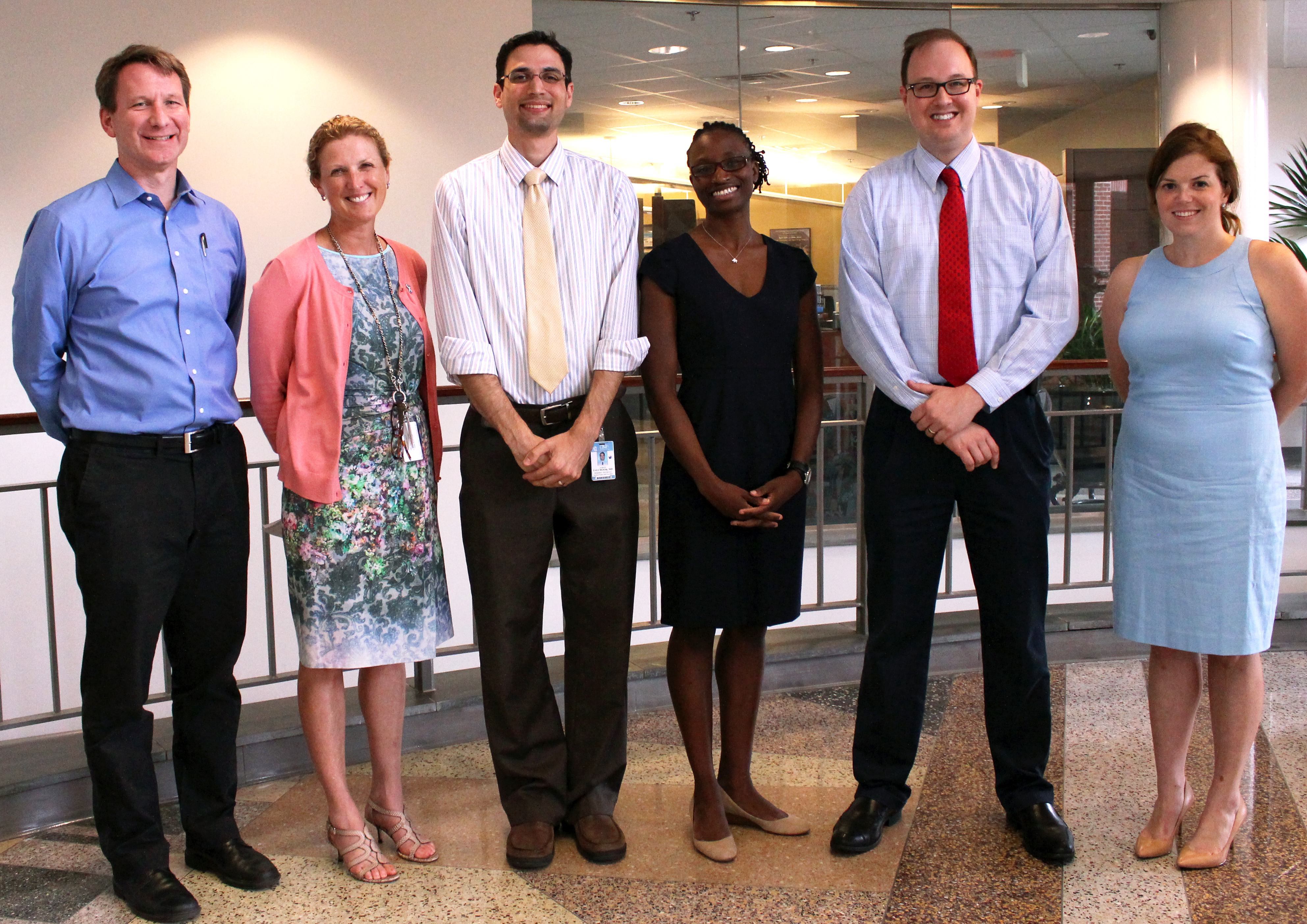

Three physician-scientists in training at the University of North Carolina School of Medicine have been honored for excellence in cancer-related research and in the practice of medical oncology.
Kemi Doll, MD, Aaron Falchook, MD, and Benjamin Vincent, MD, were honored on Tuesday as the 2015 Pope Clinical Fellows Award recipients. The awards are given annually to recognize excellence, and to promote the careers of emerging physician-researchers at the UNC Lineberger Comprehensive Cancer Center. The recipients will each receive a $5,000 award, which is made possible by a gift from The John William Pope Foundation.
“These awards recognize the work of three of our talented physician-researchers, who are both treating patients at the N.C. Cancer Hospital and also helping to make research discoveries,” said Norman Sharpless, MD, director of UNC Lineberger and the Wellcome Distinguished Professor in Cancer Research. “They are helping to make a difference in the lives of people in North Carolina.”
The three recipients were chosen from a pool of competitive candidates nominated by UNC Lineberger members, said Anne Menkens, PhD, UNC Lineberger assistant director of collaborative research. A committee of N.C. Cancer Hospital division leaders review the nominees and make a recommendation to UNC Lineberger leaders, who make the final decision.
Doll is a fellow in the Division of Gynecologic Oncology who’s also pursuing her master’s degree in clinical research in the UNC Gillings School of Global Public Health Department of Epidemiology. She has first-authored nine publications during her fellowship. In one study of outcomes among elderly, low-income women enrolled in Medicare with gynecologic cancers in North Carolina, she found that women who were also enrolled in Medicaid had higher risk of all-cause death compared to women enrolled in Medicare alone. The disparities were greatest for women with early-stage uterine and vulvar or vaginal cancers. After identifying disparities for treatable sub-populations of patients, such as this group of patients, she aims to develop interventions to close those gaps.
“Dr. Doll is someone who I would love to have on my faculty, and she is truly the elusive triple threat of good clinician, technically gifted surgeon and blossoming independent investigator,” said Paola A. Gehrig, MD, a UNC Lineberger member, a professor and the director of the Division of Gynecologic Oncology.
Falchook is chief resident in the Department of Radiation Oncology. In addition to his clinical practice, he has also been academically productive – serving as the first author of seven research publications to date, presenting research at national oncology conferences, having received multiple abstract awards at American Society of Clinical Oncology (ASCO) and American Society for Radiation Oncology (ASTRO) meetings, and serving as co-investigator of several research grants. His research projects have studied prostate, breast, salivary gland, and rectal cancers.
“This is an incredible amount of productivity that I have not previously seen in a trainee,” said Ronald Chen, MD, MPH, a UNC Lineberger member and associate professor in the UNC School of Medicine Department of Radiation Oncology. “Clinically, (Dr. Falchook) is an outstanding physician who is very highly regarded in our department. He is dedicated to his patients and has demonstrated excellent organizational and leadership skills as chief resident.”
Vincent is a fellow in the Division of Hematology/Oncology who studies tumor immunology and immunotherapy researcher in the lab of Jon Serody, MD, Elizabeth Thomas Professor of Medicine, Microbiology and Immunology and associate director of translational sciences at UNC Lineberger. In the lab, Vincent has led an effort to shift toward sequencing, bioinformatics and big data approaches to studying the immune system’s response to cancer. He was first author of a paper published in Clinical Cancer Research in which he uncovered a critical role for immune cells called B-cells in the outcome of patients with two types of breast cancer.
Serody also highlighted Vincent’s work in the clinic.
“Finally, in addition to becoming an outstanding scientist, Ben is a wonderful, compassionate and insightful clinical physician,” Serody said.
